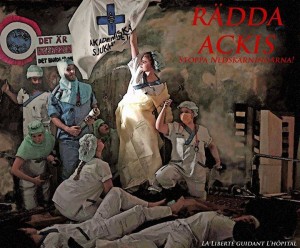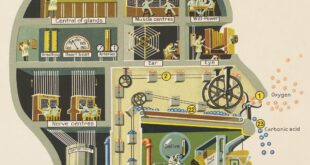by ALLT ÅT ALLA – Lund
→ Italian
The text which follows tells about the successful struggle of nurses who in 2013 organized in several Swedish cities against the reform of labour contracts. By worsening labour and wage conditions and by threatening in this way the health of patients, that reform signaled that precarization is occurring also in a country which is still regarded by collective political imaginary, as one of the most advanced welfare-system in the world. The authors of this text are part of the group which answered the call of nurses, Allt åt Alla (literally, «everything for everybody»). Allt åt Alla is also part of the international coordination Blockupy, and this text represents a first contribute to the debate on transnational social strike which started during the workshop organized in Frankfurt during the last Blockupy Festival.
***
On January 23, 2013 more than 30 nurses at the «Intensive care for children» unit in Lund (BIVA) jointly resigned in protest against impediments in their contracts. They stood united as the wind blew, overwhelmed by the solidarity coming from outside, all through their struggle. Two months later, they stood as victors. Region Skåne [the organization responsible for public care in the Skåne region] had been forced to back down, and they could keep their old contracts. Resistance pays off.
Early on, Allt åt alla started a Facebook page for anyone who wanted to show their support for their campaign. Within a few days it had gotten several thousand followers and quickly evolved into something much larger than we initially expected. In addition to images and texts from parents of children with heart defects and health care workers who wanted to show their support – our inbox began filling up with stories from hospital corridors across the country.
The contributions, the stories, were widely distributed, and got great feedback from people who could relate to the experiences described. In the comments sections, discussions were held ranging from what the recurring «efficiency improvements» actually meant (when the nurses standing there with fewer colleagues but with the same number of patients) to what actual wages looked like at various sites. Increasingly, it developed into an open community, a source of knowledge, and a place for mobilization.
On March 16th the same year, thousands of people around Skåne protested against cutbacks in health care. Region Skåne was quick to send out a press release. They had seen that in Lund, a demonstration participant had brought a sarcastic paper mascot that represented the Regional Director Jonas «health torpedo» Rastad. They were furious.
However, they were not upset about the 640 employees lacking at Skåne University after employment-stop was initiated in 2012. Nor of all the cases reported in which a shortage of hospital beds had been a direct or contributory cause of a patient’s death.
Another one of Region Skåne’s goals that year was to close a surgical unit in Landskrona; to smash another functioning institution to shambles. There, the employees themselves, with great support from the public, staged large scale demonstrations, and put pressure on both the media and on politicians. In the end, they appealed the decision, and won. The surgical unit is currently still in Landskrona.
After the nurses in Lund had won their conflict, one of them commented to Sydnytt [regional televised news service] that it «felt good that they had taken the battle». They took the battle for themselves, for their future colleagues, for patients and their families. They took a battle for all of us, and at the same time they clearly showed that it pays off to push a hard line.
Later reflections…
Some time after the events, there are a couple of lessons we can carry with us.
1. One thing we did right in this struggle (unlike leftist parties, generally) is that we did not try to take over. We were open with who we were – revolutionaries, communists – and let the nurses involved in the struggle see protocols from our meeting were we discussed militant strategies, and so on. This built trust. We did not hide our intentions or opinions. We presented our solidarity to them, and the practical thing we could help with: printing posters and other propaganda, organizing the demonstration, making banners and picket signs and making our meeting spaces available for them, and so on.
2. The Facebook-group is still thriving, although not with the same momentum. A few nurses involved in this struggle later got involved in starting up a «Health Care party» (a political dead end, in our opinion?).
3. Intervening in struggles like these feels logical in a way, since it something that affects us all. We all need health care. When our friends later got attacked by nazis and we were deep into organizing the largest antifascist manifestation ever in our city, some of the nurses expressed their solidarity to us in different ways. These were great connections to make, and a great experience for us, a practical example of one our core principles: as an organization we shall participate in struggles that bring the working class together, and forward.
 ∫connessioniprecarie connettere gli ∫connessi, produrre comunicazione
∫connessioniprecarie connettere gli ∫connessi, produrre comunicazione





